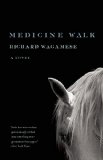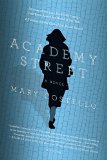Summary | Excerpt | Reading Guide | Reviews | Beyond the book | Read-Alikes | Genres & Themes | Author Bio

Best friends for many years, Marie and Simone have been through a whole lot during their long lives. They each survived World War II, left Europe, moved to America and raised their families. With their husbands dead and their children grown and moved away, the world seems so different, so changed, so open to interpretation, while still full of possibilities. What is more, now the weather is going crazy and it seems like New York, and in particular, their neighborhood of Chelsea, is in the eye of the storm - both literally and figuratively.
Kate Walbert starts with something very simple in The Sunken Cathedral – a small window into the lives of a pair of old friends - and then expands it into a tale that floats between the past, the present, and even the future. The first glimpse into Marie and Simone's lives is when they join a painting class. There they meet the art historian, Helen, along with a hodge-podge of other students. Another glimpse involves Elizabeth, the woman who, with her husband and son, rents the upper floor of Marie's home. Some of the characters in Elizabeth's son's school are included in the story, as well as Elizabeth's own feelings about living an unanchored life. All of these bits come together against the backdrop of a particularly intemperate New York winter and spring.
This may sound like a conventional, if not mundane, story, but I assure you that it is anything but. To begin with, let's take that nasty weather. At first, I thought Walbert had placed this novel around Hurricane Sandy, but several things made me realize that this couldn't be the case, and the storm in question was a fictional one. In fact, the more I read, the more I found evidence that the central action of this story takes place in the not too distant future (but not too far, considering that Marie and Simone not only lived through WWII, but they can still remember it.)
Walbert's large cast of characters is somewhat unconventional too, and, in fact, many of them have nothing to do with either of the two protagonists. While this is somewhat confusing at times, focusing solely on Marie and Simone would have given a far more myopic view of their present, and left the reader much less enriched. Walbert also uses some of the secondary characters to make connections to both the storm and the title of the book, which refers to the Debussy piano prelude of the same name. (It is his musical interpretation of the Breton legend of the City of Ys.) Through all of these details – the storm and this eclectic cast of characters – Walbert shows us how life swirls around us all, bringing us together as well as pushing us apart.
None of this would work if it weren't for Walbert's unique writing style. She gives us prose that is poetic, luscious, and utterly exquisite, while remaining both accessible and elusive. She also litters her story with footnotes, which are essentially aside descriptions. This could easily have been distracting (aside from their being technically problematic to navigate on an eReader), but instead, these tidbits add extra color to an already brilliantly vibrant mosaic. Rather than swamp this review with further adjectives, I will simply say that I haven't read a book this beautifully written since Ondaatje's The English Patient. While The Sunken Cathedral won't appeal to everyone, I'm certain that lovers of contemporary literary fiction will enjoy this novel immensely, and I cannot recommend it more highly.
![]() This review was originally published in The BookBrowse Review in June 2015, and has been updated for the
April 2016 edition.
Click here to go to this issue.
This review was originally published in The BookBrowse Review in June 2015, and has been updated for the
April 2016 edition.
Click here to go to this issue.

If you liked The Sunken Cathedral, try these:

by Richard Wagamese
Published 2016
Written in luminous prose and infused by an uncommonly rich sense of place, Medicine Walk is a stunning achievement.

by Mary Costello
Published 2016
A vibrant, intimate, hypnotic portrait of one woman's life, from an important new writer.
Your guide toexceptional books
BookBrowse seeks out and recommends the best in contemporary fiction and nonfiction—books that not only engage and entertain but also deepen our understanding of ourselves and the world around us.